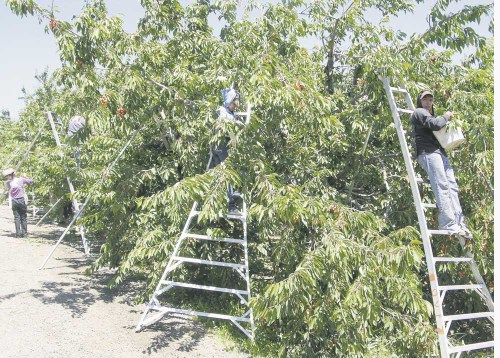Ag overtime loan proposal makes headway in Oregon Legislature
Published 4:30 pm Thursday, February 9, 2023

- Oregon’s budget-setting Joint Committee on Ways and Means is considering a loan program that would help Oregon farmers avoid cash flow problems when paying overtime wages.
SALEM — A loan program intended to prevent a cash crunch for Oregon farmers paying higher overtime wages has landed before the key budget-setting Joint Ways and Means Committee.
Last year, lawmakers voted to phase out the agricultural overtime exemption, which means farmers must pay workers time-and-a-half wages beyond certain weekly thresholds.
To ease the financial burden, that legislation included a refundable tax credit that pays for part of the additional labor costs, varying by year and the number of farm employees.
Lawmakers have since realized that farm employers could face a “cash flow problem” because their current overtime expenses won’t be reimbursed until the following tax season, said Rep. Paul Holvey, D-Eugene.
“They would be having to pay for that overtime perhaps a year before they’d be eligible to receive money from the tax credit,” Holvey said during a recent legislative hearing.
Under House Bill 2058, farmers could borrow money from the state government to endure the delay, then repay the debt upon getting the tax credit.
The loans would be limited to $40,000 a year for farmers earning $3 million or less in annual revenue under an amended version of HB 2058, which was recently passed by the House Business Labor Committee.
“This was meant as a cash advance for small employers that would not have time to wait or perhaps not have resources to wait for a tax credit to reimburse them a year later,” said Holvey, the committee’s chair.
The bill would appropriate about $10 million for the state’s Business Development Department to begin making the loans, which would need to be repaid within two years.
Because HB 2058 involves new government spending, it’s now been referred to the Joint Committee on Ways and Means.
On Feb. 13, the Joint Subcommittee on Transportation and Economic Development unanimously recommended its approval to the full Ways and Means committee.
Supporters want a quick decision on the bill so eligible farmers will be able to use the program “as soon as possible,” since some ag overtime requirements started kicking in this year, Holvey said.
However, it’s unclear whether farmers who need such loans will actually be able to obtain them, said Rep. Anna Scharf, R-Amity, who voted against referring HB 2058 to Ways and Means.
Growers typically have operating lines of credit with banks who may be resistant to them taking on additional loans, even if they’re from the state government, she said.
“I don’t think institutions that are engaged with our agricultural community are going to let them take advantage of this funding, because it puts them further in debt,” Scharf said.
Rep. Mark Owens, R-Crane, said he gets questions from farmers and ranchers every day about how the agricultural overtime legislation will be implemented.
“This is a small fix that some of our farmers need,” he said of HB 2058. “We need a much larger conversation.”
Owens said he’s unsure what to expect as the overtime exemption is fully phased out in coming years.
Farm duties often require long hours and many growers can’t afford to hire additional employees, said Owens, who produces alfalfa.
“I don’t know what we’re going to do as an industry,” he said.









